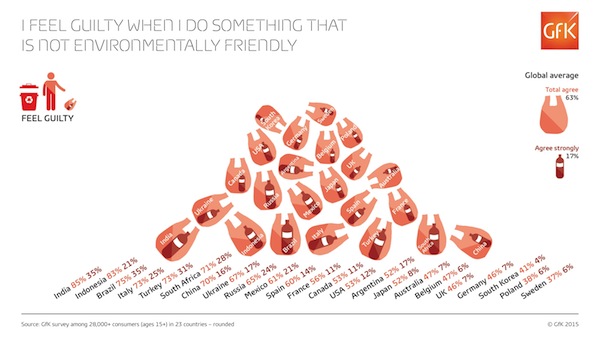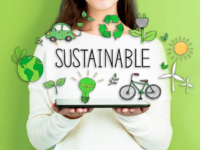 Australians place less importance on companies’ environmental values than consumers in other countries do, according to a new global survey by GfK about ethical shopping.
Australians place less importance on companies’ environmental values than consumers in other countries do, according to a new global survey by GfK about ethical shopping.
GfK asked more than 28,000 people aged 15 or older across 23 countries about how strongly they agree with specific statements.
Globally, more than three quarters (76 per cent) agree that brands and companies need to be environmentally responsible, compared to Australia’s 66 per cent.
Just short of two thirds (63 per cent) of those surveyed say they feel guilty when they do something that is not environmentally friendly, compared to 47 per cent of Australians.
GfK says Australian shoppers need for companies to be environmentally responsible isn’t being evidenced by what they do with their wallets, given the 18 per cent gap between the need for corporate environmental responsibility versus those actually buying according to their beliefs and ideals (48 per cent).
Of the 23 countries surveyed, Australia ranked third bottom for the need for environmental responsibility, fifth last for guilt, and also fifth for shopping according to beliefs and ideals.
Brands need to be environmentally responsible
Internationally, more than three quarters of women (78 per cent) and exactly three quarters of men (75 per cent) agree that brands and companies have to be environmentally responsible.
When it comes to different age groups, there is a fairly even distribution of those in overall agreement, with the 30 to 39 year olds slightly ahead at 80 per cent, followed by 40 to 49 year olds (78 per cent) and those aged 60 and over (77 per cent).
The youngest age group, 15 to 19 year olds, boast more than two thirds (69 per cent) agreeing with the statement – so, although they come behind the other age groups, a clear majority is still saying that brands and companies have to be environmentally responsible.
The age groups that show the highest numbers saying that they agree strongly with this statement, however, are the 50 to 59 (31 per cent) and 40 to 49 year olds (30 per cent).
Looking at individual countries, consumers in India and Indonesia express the highest overall agreement with this statement (94 and 93 per cent respectively), and even in those countries with the lowest levels of agreement – Japan at 58 per cent and Sweden at 62 per cent – GfK says it’s still seeing well over half of their consumers backing this statement.
The countries that show the greatest intensity of support (those agreeing strongly that brands have to be environmentally responsible) are Brazil with 47 per cent, Turkey with 46 per cent, and Russia with 40 per cent of consumers.’
Feeling guilty
On the question of personal responsibility, nearly two thirds (63 per cent) of consumers internationally say they feel guilty when they do something that is not environmentally friendly – including 17 per cent who agree strongly that that is the case.
This is again slightly led by women, at 64 per cent agreeing in total and 18 per cent agreeing strongly, compared to men at 61 per cent in total and 15 per cent agreeing strongly.
The breakdown by age groups shows a very even spread, ranging from 58 per cent of those aged 50 and over agreeing that they feel guilty when they do something that is not environmentally friendly, up to 65 per cent of all those aged 20-39.
A point to note is that 15 to 19 year olds show the highest percentage strongly agreeing that they personally feel guilty when they do something that is not environmentally friendly (18 per cent).
This indicates greater awareness amongst teenagers than previous generations that protecting the environment is a personal responsibility.
When it comes to countries, India and Indonesia again lead for numbers feeling guilty when they do something not environmentally sound, standing at 85 and 83 per cent respectively – while South Korea (41 per cent), Poland (38 per cent) and Sweden (37 per cent) bring up the rear. But it is in India and Brazil (both 35 per cent) that has the greatest percentage of people giving the strongest agreement about green guilt.
Only buy things that appeal to beliefs
Globally, the split across age groups for those buying things appealing to beliefs is a little varied, with around two thirds of 30 to 39 year olds (68 per cent) and 20 to 29 year olds (65 per cent) agreeing overall, compared to 57 percent of 15 to 19 year olds and those aged 60 or over.
When it comes to giving strong agreement that they only buy products and services that appeal to their beliefs, the 40 to 49 year olds take the lead with 18 per cent, compared to all the other age groups with 15 percent each.
The breakdown by country shows India and Indonesia in the lead , with India at 94 per cent agreeing overall while Indonesia follows with 78 per cent, equal with Ukraine.
India also has significantly higher percentage agreeing strongly that they only buy products and services that appeal to their beliefs, standing at 47 per cent, compared to the next closest country, South Africa, at 31 per cent.


















